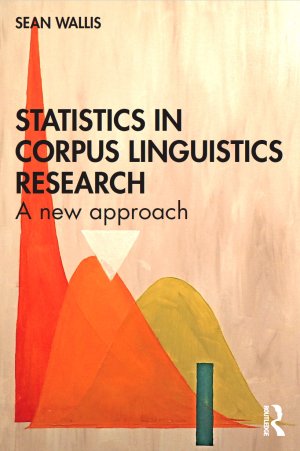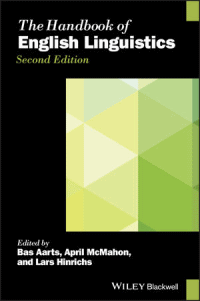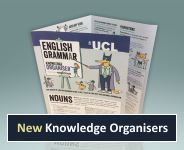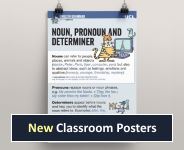The Survey of English Usage carries out research in English Linguistics. It was the first Corpus Linguistics research centre established in Europe (and the second in the world). We have been building corpora and analysing grammar for more than 60 years, and our parsed corpora and software remain world-leading.
We are based in the Department of English Language and Literature at UCL.
News, events and resources
English Grammar Day 2024
We are pleased to announce the ninth annual English Grammar Day on 28 June 2024, which sees us return to the British Library, where the English Grammar Day was born!
This public event is jointly organised by the Survey of English Usage, the University of Oxford and the British Library.
Booking is now open for 28 June 2024. English Grammar Days are frequently fully booked and attract a great number of teachers and school children, as well as members of the public and the press. Please reserve the date.
You can watch the short video below about a previous English Grammar Day (2016).
![]() English
Grammar Day 2024
English
Grammar Day 2024
![]() The 'English
Grammar Day' and its history
The 'English
Grammar Day' and its history
|
|
We are pleased to announce this year's Summer School, which will take place from 1 to 3 July 2024.
Our online Summer School in English Corpus Linguistics takes place in a time slot designed to make it internationally inclusive from Europe to Asia. We cover grammar, discourse, corpus methodology and statistics in one unique three-day event. This year will see a new session on World Englishes. Current students are entitled to a free copy of ICE-GB or DCPSE, and all other attendees are offered a large discount on the regular price.
Places are limited, and there is a reduced price on all orders until the end of 14 May.
![]() More
information and how to book
More
information and how to book
Survey Seminars
The Survey of English Usage organises a number of seminars each year for staff and students from the Faculty of Arts and Humanities and beyond. They are generously sponsored by the English Department.
This term we heard from Justyna Robinson from the University of Sussex, who talked about mass observing concept change during the Covid-19 pandemic. On 14 March we were joined by Theresa Neumaier from the Technical University, Dortmund, who spoke about the grammatical forms and functions found in an archive of threatening letters in Late Modern English.
Online courses
FutureLearn courses
![]() Bas Aarts and Luke Pearce have
created two new courses on the FutureLearn platform.
Bas Aarts and Luke Pearce have
created two new courses on the FutureLearn platform.
English Grammar: All You Need to Know is a six-week course for anyone who is interested in the topic which takes an in-depth look at the nuts and bolts of English grammar. (Please note, if you are a UK teacher, our course English Grammar for Teachers will be more suitable for you.) The course has already attracted over 3,000 participants from 156 countries. It discusses the following topics:
- The building blocks of English sentences: word classes, phrases and clauses
- Grammatical functions and semantic roles
- Using words and phrases to build clauses
- Talking about time: tense and aspect
- Talking about what is possible, probable and necessary: mood and modality
- How to communicate effectively: presenting information
Teaching English Grammar in Context is a follow-on course for our FutureLearn course English Grammar for Teachers. It helps teachers to teach English grammar effectively and enjoyably using real texts, such as novels, poems and songs. On this five-week course, teachers will discover methods for teaching English grammar in context throughout primary and secondary education. With this approach, they can employ grammar in other aspects of their teaching for a more unified experience. This technique has also been shown to have positive impacts on students’ creative writing and analytical reading.
Recent publications
 |
|
Statistics in Corpus Linguistics Research
An original book on statistics for researchers in corpus linguistics, written by Sean Wallis. The book draws on decades of collaborative corpus linguistics research at the Survey with colleagues around the world, and ten years of independent research in statistics.
- Outlines and develops the ‘Survey Methodology’ in Corpus Linguistics
- Promotes a perspective of linguistics research driven by theoretical frameworks and analysis, not merely what the data allows us to see
- Explains statistical inference from first principles
- Argues for a focus on confidence intervals rather than ‘p values’ to understand your data, what you are testing, and what your results might mean
- Presents a series of novel statistical methods motivated by Corpus Linguistics analysis problems
- Shows how to reinstate logical reasoning into statistical claims
This book is written for researchers and students of linguistics from undergraduate level upwards.
![]() More Information
More Information
![]() Resources: Further
reading, data and calculators
Resources: Further
reading, data and calculators
 |
|
The Handbook of English Linguistics (2nd Edition)
The second edition of the popular Handbook of English Linguistics brings together stimulating discussions of the core topics in English linguistics in a single, authoritative volume. Edited by Bas Aarts, Alice McMahon and Lars Hinrichs, the chapters cover syntax, methodology, phonetics and phonology, lexis and morphology, variation, stylistics, and discourse, and also provide discussions of theoretical and descriptive research in the field.
This revised edition:
- Presents thirty-two in-depth, yet accessible, chapters that discuss new research findings across the field, written by both established and emerging scholars from around the world
- Builds upon the very successful first edition, published in 2006
- Incorporates new trends in English linguistics, including digital research methods and theoretical advances in all subfields
- Suggests future research directions
This book is an essential reference work for researchers and students working in the field of English language and linguistics.
Oxford Handbook of English Grammar
 |
|
An authoritative, critical survey of current research and knowledge in the grammar of the English language. Edited by Bas Aarts and Jill Bowie of the Survey of English Usage with Geri Popova of Goldsmiths, it contains 31 chapters by linguists from Aarts to Ziegler.
- Addresses foundational areas of research methodology
- Explores a range of theoretical approaches to English grammar
- Covers all the core subdomains of grammar, including morphology
- Examines the relationship between grammar and other areas of linguistics
- Explores grammatical variation across genres and dialects, and change over time
The handbook's wide-ranging coverage will appeal to researchers and students of English language and linguistics from undergraduate level upwards.
English Grammar for Schools resources
We have published a set of Englicious grammar resources for teachers and children in UK primary and secondary schools.
Written by Bas Aarts and Ian Cushing, using simple language and practical examples, these classroom resources explain the key grammatical terms in the English National Curriculum that primary and secondary school teachers are expected to teach. Prices start from £4.95 for a knowledge organiser, with savings for bulk purchases.
The resources are a spin-off from our Teaching English Grammar in Schools project and are published by UCL Business. Income helps to support the Englicious project.
![]() For more information, for prices and
how to order, click on the images above.
For more information, for prices and
how to order, click on the images above.
![]() View high-resolution previews of our print resources
View high-resolution previews of our print resources
Free Grammar Resources for School Teachers — the Englicious Website
We are pleased to see our Englicious website going from strength to strength, with more teachers signing up every day. Englicious (www.englicious.org) is an online resource for improving the teaching of English grammar and literacy in UK schools. Our site uses the latest UK National Curriculum grammar terminology and spans both the primary and secondary sectors.
We run two courses for school teachers, in conjunction with the UCL Institute of Education, Grammar for Teachers and Teaching English Grammar in Context, both of which use Englicious.
![]() Englicious
website
Englicious
website
![]() English Grammar for Teachers course
English Grammar for Teachers course
![]() Teaching English Grammar in Context
Teaching English Grammar in Context
In the following video, school teachers at St Aidan's Primary School, North London, talk about their experience using Englicious in the classroom.
 |
|
Two major parsed corpora of British English are available to order from the Survey of English Usage.
- The Diachronic Corpus of Present-Day Spoken English (DCPSE) consists of 87,000 trees and 800,000 words of spoken English across the decades.
- Release 2 of The British Component of the International Corpus of English (ICE-GB) is an upgrade of the popular 1 million-word ICE-GB corpus.
Both corpora are released with the latest ICECUP 3.1 software.
![]() More information, free sample
downloads and order forms are here.
More information, free sample
downloads and order forms are here.
Nuffield grammar teaching project outcome
Researchers at the Survey of English Usage and Literature and UCL Institute of Education (IOE) completed a project which set out to investigate whether a new approach to teaching six- and seven-year-olds about grammar can help their writing.Funded by the Nuffield Foundation, the project involved a Randomised Controlled Trial (RCT) and in-depth Process Analysis to determine if the approach to grammar is effective in improving children’s writing. The results of the project can be found here.
Grammar Practice KS2
App for iOS - Android coming soon
Our very latest mobile app, Grammar Practice KS2, is designed for UK primary school students to test themselves in preparation for the Key Stage 2 Grammar Test at the end of Year 6.
Developed as a spin-off of the Englicious project, GP KS2 contains:
- Extensive practice material — 50 exercises with nearly 3,000 test questions.
- The complete 'non-statutory' New UK National Curriculum Grammar Glossary as a bonus, plus explanations from the Englicious website.
The test changed last year — our app is up-to-date.
![]() Grammar
Practice KS2
Grammar
Practice KS2
![]() Other UCL English Apps
Other UCL English Apps
![]() Our website is 'mobile-friendly'.
Hand-held users have the option of a new 'mobile reader mode'
alongside the standard desktop view.
Our website is 'mobile-friendly'.
Hand-held users have the option of a new 'mobile reader mode'
alongside the standard desktop view.
ICECUP
![]() The latest version
of our state-of-the-art ICECUP software is available for
download from our website.
The latest version
of our state-of-the-art ICECUP software is available for
download from our website.
We distribute ICECUP for free with our corpora, along with an extensive help manual.
ICECUP is a research platform for working with parsed corpora. First released in 1998, and continually maintained, it allows novice and experienced researchers alike to explore corpora, learn the rich grammatical framework, and conduct systematic research in (and using) the grammatical analysis embodied in the corpus.
You can download a free ICE-GB or DCPSE sample corpus to experiment for yourself.
|
|
|
 |
|
Englicious was developed out of the AHRC Knowledge Transfer Fellowship Creating a Web-Based Platform for English Language Teaching and Learning started in 2010. This project involved building a website of interactive structured English language courses with a grammatical focus, initially tailored to the goals of the National Curriculum’s Key Stages 3-5. The resource consists of lesson modules dynamically accessing the corpora based at the Survey. The project was subsequently supported by the EPSRC via a UCL BEAMS Enterprise Award in 2012.
The Survey was subsequently awarded Follow-on Funding in 2013 for Impact and Engagement by the AHRC to develop teaching and learning materials for English primary schools. The new content is specifically aimed at pupils at Key Stages 1 and 2 in three domains, namely spelling, punctuation and grammar, and forms part of the Englicious website. This short project started on 1 September 2013 and ran for six months.
The UCL team worked closely with a number of partners, namely the National Association for the Teaching of English (NATE), St Aidan's VC Primary School in north London, and UCL Business PLC (UCL’s Technology Transfer company).
AWE:
Academic guidance in your pocket!
App for iOS and Android
We are proud to announce the release of Academic Writing in English (AWE), a new app for the iPhone, iPod Touch, iPad and Android devices. AWE is an interactive self-learning course in academic writing that takes you on a journey from critical thinking skills and organising your writing, via questions of English word choice and grammar, to identifying (and addressing) ambiguity in your own writing.
AWE is for undergraduates, postgraduates, professional academics and secondary school students preparing for university – in short, anyone who does academic writing. It is for native and non-native speakers of English.
Grammar at your fingertips:
App for iOS and Android
We are proud to announce the release of the iGE App for the iPhone, iPod Touch, iPad and Android devices. The interactive Grammar of English is a complete course in Modern English Grammar. iGE updates our popular Internet Grammar, and presents it as a mobile application for a phone or tablet.
![]() Click here for more information. The latest
iGE 1.1 release is published for Android and the latest Apple
devices.
Click here for more information. The latest
iGE 1.1 release is published for Android and the latest Apple
devices.
This page last modified 20 September, 2022 by Survey Web Administrator.




